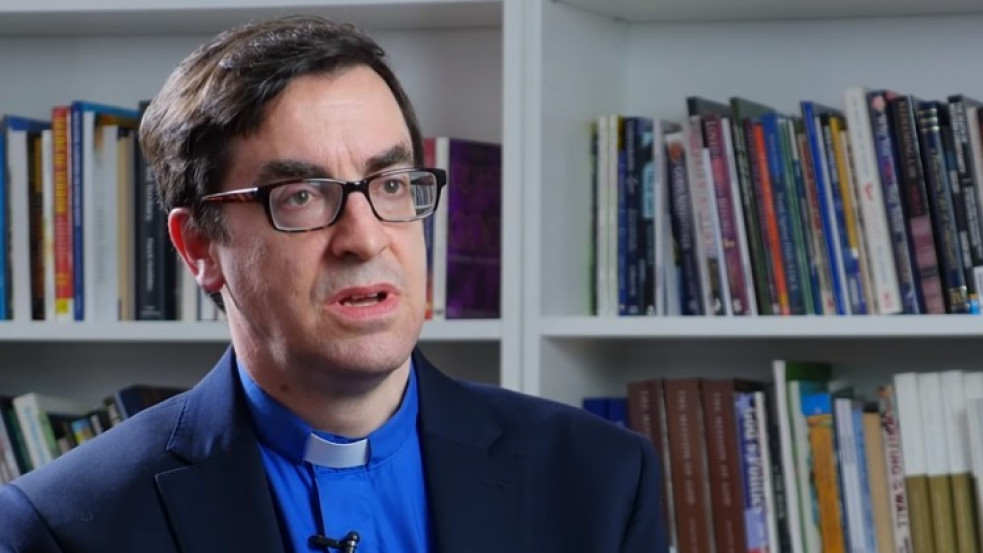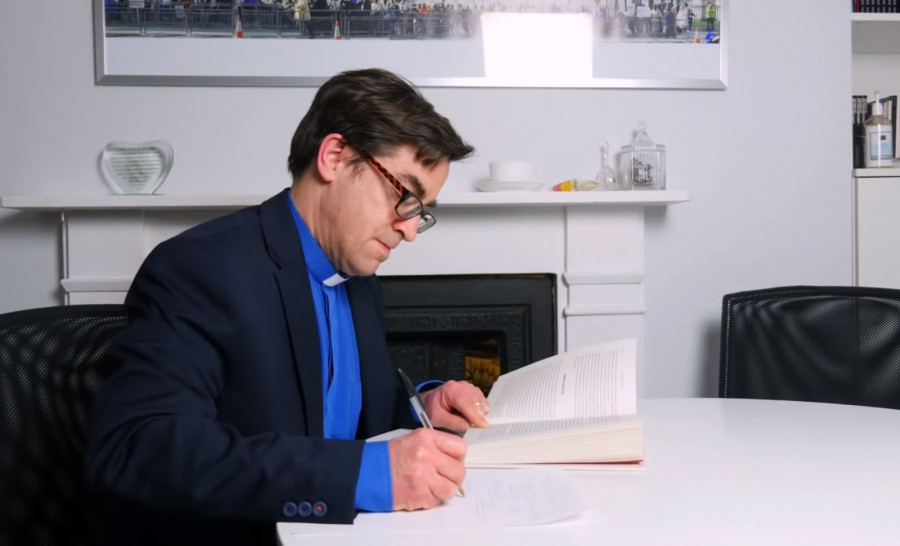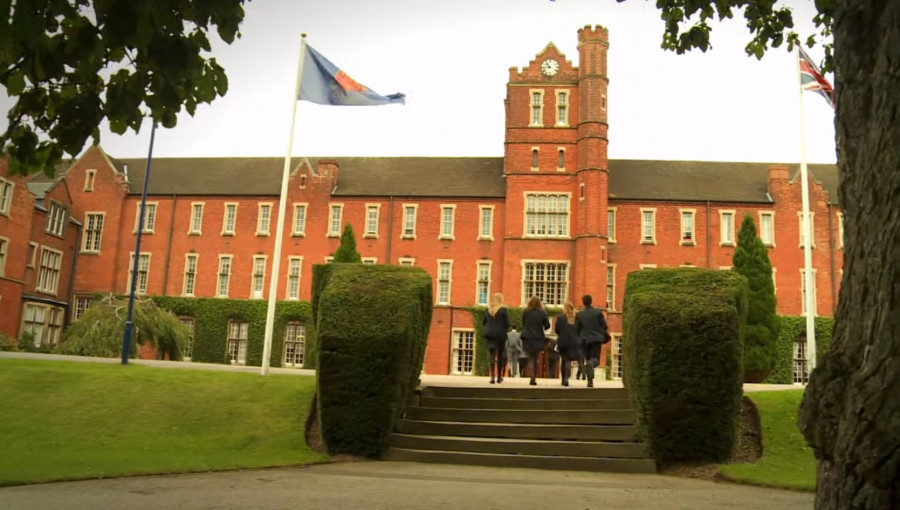
Could you summerize for me shortly, what were the events that led to your dismissal by your school and your church as well?
I was working as a chaplain in Trent College, which has a Church of England foundation. I found it worrying when senior leadership invited an aggressively pro-LGBT group called Educate and Celebrate, which is specifically using some of the ideas of queer theory, breaking down all barriers and binaries. It is not simply about being kind to people, it is a very political agenda. A student asked me to do a sermon on the question of how can we be told we have to accept all this LGBT ideology in a Christian school. I told them, they can actually make up their own mind, they don't have to accept anybody else's ideas regardless of what those ideas are. I gave examples of disagreements between the opinions of LGBT activists and mainstream Christian beliefs, making it clear that according to Christian faith, marriage is only between a man and a woman, sexual activity only happens within a marriage, and you cannot change your sex. Christians do want to look at what's true when they're deciding social policy or anything else like that. But most importantly, you have to respect people you disagree with.
Love your neighbors as yourself doesn't mean you have to agree with them on everything, but it does mean you have to respect the people.
After the sermon, I was disciplined by the school. I was dismissed for gross misconduct because people got upset by what I had to say. I appealed, and the school governors, the board of trustees reinstated me with a final warning and a list of 20 conditions I had to follow, which included never mentioning anything controversial anywhere in the school and censorship of all my sermons by the senior leadership.
Then Covid came along, and in my opinion, they used that as an excuse to get rid of me. They claimed it was for financial reasons, they needed the money and couldn't afford to employ a chaplain anymore. I sued the school for discrimination, harassment and victimization. I gave the sermon in 2019, they got rid of me at the end of 2020 and my case wasn't heard until September last year.
In February we lost. The judge said it was perfectly reasonable to dismiss me, because it was a safeguarding matter, since the school had reported me to Prevent, the anti-terrorism watchdog of the British government. She added that it was inappropriate for me in a sermon to use persuasive language about Christian beliefs. We have put in an appeal against that judgment and hopefully it will be overturned.

What do you do now?
I'm currently working for the Open University, which is basically a distance learning university in Britain. I am teaching history, literature, music, classical studies, philosophy, and a bit of religious studies. It is not what I want to be doing because I can't work in a church. My bishop is currently treating me as if I might be a safeguarding risk for having taught the Church of England's own teaching on matters of sexuality. She won't give me permission to lead services. The only way I could get around that would be to admit that I had put children at risk and I'm not prepared to do that.
What do you think of the current state of the Church of England? A sharp divide seems to be unfolding along the lines of who adhere to the eternal, unchangeable biblical truths, and who adapt to the culture, integrating the acceptance of the LGBT lifestyle.
Personally, I think we're not at schism yet, but we're heading that way. There are clearly some who are very, very strongly pro-LGBT and want to have same sex marriage and go the whole thing. There are others who are saying, no, you can't get around what the Bible says. I think there are quite a lot of people in the middle as well. For my part, it looks as if people who are very strongly LGBT friendly and who are already effectively doing weddings in churches of same-sex couples, and they never get into trouble. Whereas the teaching of the Church is what it historically is. Despite that, there's no effort to support me or allow me to have that point of view.
Although officially the Church of England's teaching hasn't changed, behind the scenes, they won't punish people who break the rules, but someone like me who stands by the rules is punished effectively, and that tells you where the bishops and the hierarchy are heading.
They don't want to look to the rest of society as if they hold old-fashioned views. But I think truth is truth, no matter how old it is. Call me a strange person, but I thought the church should reach out to sinners with the good news of salvation instead of patting them on the back, saying don't worry, everything will be fine.
In your opinion, how a true church should look like and function, and what is an authentic Christian like, what should he believe and what values should he stand for in an era like this?
Fundamentally, in my opinion, the church should be a community of people who confess that Jesus is Lord. This is the main thing. Jesus is King, Jesus is the monarch. There is no democracy within the church. It is His law we follow, not some set of rules we agree on ourselves. As soon as you're in that position, then you have to look at the Bible and say, well this is the word of God. Jesus is the word. The Gospel of John begins like this: "In the beginning was the Word, and the Word was with God, and God was the Word." Therefore, if we confess that Jesus is Lord, we must also confess that God's Word, the Bible, is also Lord, because the two are practically the same.
If we say that Jesus is the Lord, worldly culture and politics cannot be lord over him. We have one God, and it is not Caesar.
The Scriptures are absolutely clear about marriage and sexuality, leaving no room for gender reassignment or homosexual marriage. The church must clearly state that society is wrong and is not moving in a healthy direction. There are many theories about what is really good for a person. However, if we accept that people are created in the image of God, then what God wants for us will be truly good. We are all tempted to do things we shouldn't, things we know aren't good for us. Even if our actions do not cause harm to others, they cause harm to us, who are in the image of God.

There is a big debate in society about whether Christianity can only be practiced in churches and „between the four walls”, or whether it can also be practiced on the streets, in institutions and in the workplace. What do you think about this?
If we say that people's beliefs and opinions can only be expressed in their own homes and not in the public sphere, we must apply this to everyone in the same way. Also for those who believe in Marxism, or maybe in old-school Socialism. Based on this logic, they too could only represent and live their beliefs within the four walls, just like those who, for example, believe that the most important thing in the world is to reduce carbon-dioxide emissions.
Either everybody's beliefs can be shared, be in the open, and be part of public debate, or nobody's beliefs can be. So if the Atheists are allowed their beliefs, in this case particularly on transgenderism and surgery for children to fit their gender identity, if they're allowed to say they believe in gender identity, then Christians should be allowed to say, we don't believe in gender identity, there's no such thing, it's nonsense. That's the public debate.
You can't let one side express their beliefs in public and not the other, but it is a strategy that the left use, because they try to win the argument by not even letting you have the argument. And that's cheating to my mind, but they don't mind cheating.
If a Christian confesses that Jesus is Lord and follows God's commandments, he will follow them even when he leaves his house. Even if at times this will inevitably lead to clashes with the secular society, since they consider other things important than what the government represents. We don't have to look very far (Stalinist Russia, Maoist China, Canada under the presidency of Justin Trudeau) to see where does it lead when citizens consider what the government says to be the most important. For true Christians, God will always be the supreme authority, and God is actually loving. The government is not loving, it only cares about power.
Not long ago, there was a case in the United Kingdom in which, although the law clearly did not prohibit it, a lady was detained by the police for silent prayer in front of an abortion clinic. What does it say about a society if authorities can just ask a person what's going on in their head? And if they find out that she is praying, she will be told that it is a crime.
I think it's really worrying. Even the Stasi in East Germany didn't go up to people in broad daylight to ask „What are you thinking?”. They waited to get people in secret to interrogate them. It is scary that somehow the right to abortion is more important than the right to simply to be in a particular public place and to quietly do whatever you're doing. Freedoms are being taken away piece by piece. In the case of Christians, the fact that they see us a bit strange in the first place is also an aggravating factor. Why would we want to pray in public? They don't understand and don't think it matters much, since they are on the side of abortion from the start. The decision is a little anti-Christian, a little anti-religion, a little anti-free speech, but who cares?
However, every time someone says "who cares", another piece of freedom is lost.
We can't pretend that religious freedom is valid in this and that case, unless A, B, C, D. Finally, only if you're locked in a cupboard inside your own home in the dark. This is how we get to the underground churches of communist Europe.
The number of negative discrimination and rights violations against Bible-believing Christians who stand up for their faith seems to be increasing. How, for example, do British society and British Christians react to these matters?
I think a lot of people don't speak out, whether because they're indifferent, or intimidated, or bit or both. People who take their Christian faith seriously are very much minority now, and it is easy to passively tolerate the suffering of minorities when it does not affect our own lives and comfort. But we know what apathy leads to, just look at the events of the 20th century.
Part of the problem is that Christians in the West, specifically in Great Britain and in North America, have not experienced real suffering for a long time. What I had to go through was difficult, but I didn't have to fear that the secret police would suddenly kick in the door. Because there are no people in our community who remember what it is like to suffer, no one is willing to believe that it can happen, nor are they prepared for it. But I think that things are going to get worse before they get better.
I would not be surprised if, within 20-30 years, real Christians could only live their faith in small, hidden groups. But then, according to my belief, God will bring a revival.
I believe that a situation similar to modern-day China may develop in the West, where the officially authorized churches will be closely linked to a secular morality, they will not dare to preach anything else, nor will they want to. The small, independent underground churches will keep the authentic Christian movement that accepts Jesus as Lord alive. Jesus said: "And what do you benefit, if you gain the whole world but lose your own soul?" I think this is exactly what happened to the West: it won the world but lost its soul.